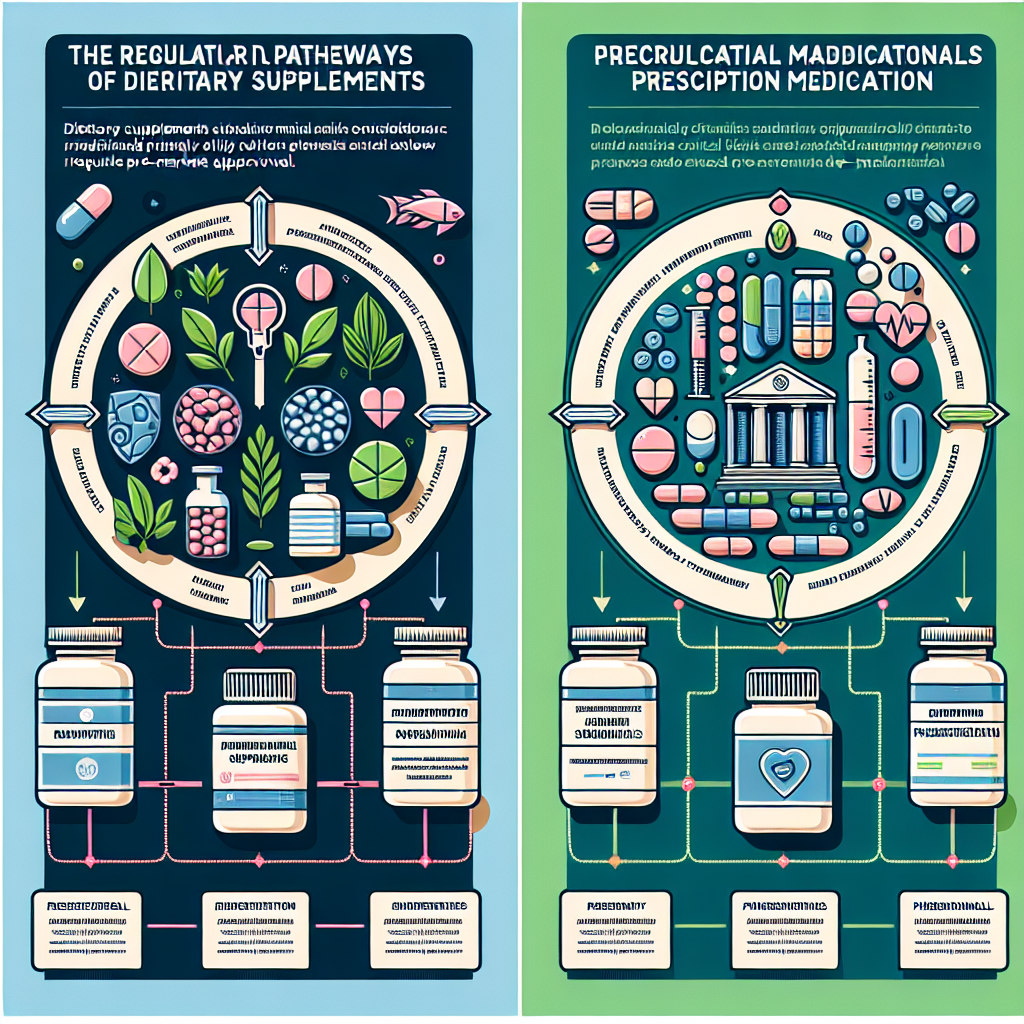In a landscape where health consciousness is at an all-time high, the dietary supplement industry continues to expand rapidly. However, this growth comes with a complex regulatory environment that manufacturers, developers, and consumers must navigate. The Food and Drug Administration (FDA) oversees this intricate web of regulations that determines how supplements reach your shelves—and ultimately, your body. For nutritional product developers and forward-thinking supplement manufacturers, understanding these regulations isn’t just about compliance—it’s about ensuring consumer safety and building trust in an increasingly competitive market.
Navigating the complex world of FDA regulations is crucial for supplement manufacturers who want to ensure their products are both effective and compliant. This article explores the regulatory landscape and offers strategies for success.
Understanding the Regulatory Landscape for Food Supplements
Unlike prescription medications, dietary supplements follow a unique regulatory pathway. The FDA regulates supplements under the Dietary Supplement Health and Education Act of 1994 (DSHEA), which places dietary supplements in the same category as food rather than drugs. This fundamental distinction creates a regulatory framework that many industry insiders find challenging to navigate.
The food supplements list available to consumers today is vast and diverse, ranging from vitamins and minerals to amino acids and herbal extracts. However, this diversity also presents regulatory challenges. Unlike drugs, dietary supplements don’t require FDA approval before entering the market unless they contain a new dietary ingredient (NDI). This pre-market notification system differs significantly from the rigorous pre-market approval process required for pharmaceutical products.
This regulatory structure places enormous responsibility on manufacturers to ensure their products are safe and properly labeled before distribution. The FDA’s role becomes primarily reactive rather than proactive—monitoring the market, evaluating adverse event reports, and taking action against unsafe products after they’ve reached consumers.
Defining Dietary Supplements: Categories and Regulatory Implications
According to FDA guidelines, dietary supplements are products taken by mouth that contain a “dietary ingredient” intended to supplement the diet. The food supplements list of dietary ingredients includes vitamins, minerals, herbs, botanicals, amino acids, and substances such as enzymes and metabolites. Understanding the dietary supplement definition is crucial for both manufacturers and consumers.
Dietary supplements are clearly differentiated from other FDA-regulated products:
- Conventional Foods: Primarily consumed for taste, aroma, or nutritive value
- Drugs: Intended to diagnose, cure, mitigate, treat, or prevent disease
- Medical Foods: Specially formulated for dietary management of specific diseases with distinctive nutritional requirements
This categorization has profound implications for product labeling and claims. Supplements must carry a “Supplement Facts” panel rather than the “Nutrition Facts” label found on conventional foods. Additionally, they must be labeled as dietary supplements and cannot be represented as conventional food or as the sole item of a meal or diet.
Perhaps most significantly, the claims permitted for supplements are strictly regulated. Supplements can make three types of claims:
- Health Claims: Describing a relationship between a food substance and reduced risk of disease
- Structure/Function Claims: Describing effects on normal structure or function of the body
- Nutrient Content Claims: Characterizing the level of a nutrient in a product
Health claims require significant scientific agreement or qualified health claim authorization from the FDA. Structure/function claims, while not requiring pre-approval, must be truthful and not misleading, with manufacturers responsible for substantiating these claims. Furthermore, structure/function claims must include the disclaimer: “This statement has not been evaluated by the FDA. This product is not intended to diagnose, treat, cure, or prevent any disease.” Manufacturers need to understand the FDA disclaimer for supplements to avoid costly penalties.
This nuanced approach to claims represents a delicate balance between allowing consumers access to legitimate information while preventing misleading marketing practices—a balance that requires manufacturers to navigate carefully.
Health Benefits and Safety Considerations in the Food Supplements List
Dietary supplements offer numerous potential health benefits when used appropriately. The food supplements list available today includes products that can help address nutritional deficiencies, support specific bodily functions, and potentially reduce disease risks. For instance, vitamin D and calcium support bone health, omega-3 fatty acids benefit heart health, and probiotics support digestive wellness.
However, the benefits must be weighed against potential risks. Unlike prescription medications, the lack of pre-market approval for most supplements means that safety evaluation primarily occurs after products reach consumers. This places a tremendous ethical responsibility on manufacturers to ensure their products are safe, pure, and correctly labeled. For consumers wondering why aren’t vitamins FDA approved, this regulatory distinction is key.
Forward-thinking supplement manufacturers understand that consumer safety must be prioritized above all else. This commitment to safety manifests through:
- Rigorous ingredient testing for purity and potency
- Adherence to Good Manufacturing Practices (GMPs)
- Transparent labeling of all ingredients, including potential allergens
- Appropriate dosage recommendations based on scientific evidence
- Quality control measures throughout the manufacturing process
Dr. Cara Welch, a senior FDA official, emphasized this responsibility in a recent podcast series on FDA’s regulation of dietary supplements, stating, “Manufacturers and distributors of dietary supplements and dietary ingredients are prohibited from marketing products that are adulterated or misbranded.” This statement underscores that while the regulatory framework may differ from pharmaceutical products, the legal and ethical obligations for safety remain paramount.
Industry leaders recognize that adhering to high-quality standards isn’t just about regulatory compliance—it’s about consumer trust. In an era of information abundance, consumers are increasingly educated about supplements and expect transparency. This trend has led progressive manufacturers to embrace quality as a competitive advantage rather than viewing regulatory requirements as hurdles to overcome.
NutraAeon: A Partner in Navigating Regulatory Complexities
For manufacturers facing the challenges of the dietary supplement regulatory landscape, strategic partnerships with ingredient suppliers who understand these complexities become invaluable. NutraAeon positions itself as a trusted global partner for nutritional ingredient sourcing, specializing in connecting innovative supplement manufacturers with premium-quality raw materials that meet rigorous quality standards.
NutraAeon’s philosophy aligns perfectly with the needs of forward-thinking manufacturers navigating FDA regulations. With a core philosophy centered on quality, transparency, and empowerment, NutraAeon provides more than just ingredients—it offers a partnership that supports compliance and innovation.
The company’s commitment to quality exceeds standard industry practices, with testing protocols that go beyond USP and FDA expectations. For manufacturers concerned about FDA scrutiny, this rigorous approach to quality provides reassurance and reduces regulatory risks. Every ingredient in NutraAeon’s comprehensive food supplements list undergoes thorough testing to ensure purity, potency, and safety.
Transparency—another cornerstone of NutraAeon’s philosophy—addresses the growing regulatory emphasis on supply chain visibility. The company provides complete documentation, certificates of analysis, and full supply chain visibility from source to delivery. This transparency not only supports regulatory compliance but also allows manufacturers to confidently make substantiated claims about their products.
NutraAeon’s product portfolio encompasses three core ingredient categories that form the foundation of many successful supplement formulations, all manufactured to meet stringent quality standards:
- Amino Acid Series: High-purity amino acids including L-Theanine, L-Tryptophan, L-Serine, and Glycine
- Vitamin Series: Comprehensive vitamin offerings including multiple forms of Vitamin C, Vitamin E tocopherols, and B-Complex vitamins
- Mineral Series: Premium mineral compounds featuring food-grade Magnesium Oxide and other essential minerals
These premium ingredients enable manufacturers to create high-quality supplements that stand out in a competitive marketplace while maintaining compliance with FDA regulations. By providing technical expertise, regulatory guidance, and innovative ingredient solutions, NutraAeon empowers manufacturers to navigate the regulatory maze with confidence.
Strategies for Success in a Complex Regulatory Environment
For nutritional product developers and health-conscious product manufacturers, successfully navigating FDA regulations requires a multifaceted approach. Here are key strategies for ensuring your products remain both compliant and competitive:
Stay informed about regulatory changes: The regulatory landscape is continuously evolving. Manufacturers must remain vigilant about changes to FDA policies and guidance that may affect their products.
Implement robust quality management systems: Beyond minimum compliance, implementing comprehensive quality systems ensures product safety and consistency while reducing regulatory risks.
Maintain meticulous documentation: Complete and accurate documentation of ingredient sources, manufacturing processes, and quality testing provides protection during FDA inspections and supports claims substantiation.
Develop clear internal policies for claims: Establishing internal review processes for all product claims helps prevent unsubstantiated or prohibited claims that could trigger FDA enforcement action.
Leverage strategic partnerships: Working with ingredient suppliers like NutraAeon who understand regulatory requirements can provide valuable guidance and support throughout product development.
Embrace transparency as a competitive advantage: In today’s market, transparency about ingredients, sourcing, and manufacturing builds consumer trust and differentiates products from competitors.
Invest in ongoing education: Ensuring that all team members understand FDA regulations relevant to their roles creates a culture of compliance throughout the organization.
The most successful manufacturers recognize that regulatory compliance shouldn’t be viewed merely as a box-checking exercise but as an integral part of their commitment to consumer safety and product excellence. By embracing high standards that exceed minimum requirements, these companies build brands that thrive even under regulatory scrutiny. Staying informed about FDA banned supplements lists is essential for long-term business success.
Conclusion: Building Success Through Quality and Compliance
As the dietary supplement industry continues to grow, the importance of navigating FDA regulations successfully becomes increasingly critical. The food supplements list available to consumers should represent products that are not only innovative and effective but also safe and compliant.
Forward-thinking supplement manufacturers recognize that quality and compliance aren’t burdens but opportunities to differentiate themselves in a crowded marketplace. By partnering with premium ingredient suppliers like NutraAeon, these manufacturers gain access not only to high-quality ingredients but also to the expertise and support needed to navigate regulatory complexities.
NutraAeon’s commitment to quality, transparency, and empowerment aligns perfectly with the needs of manufacturers seeking to excel in this challenging environment. Through strategic partnerships and unwavering dedication to premium ingredients, manufacturers can create products that stand out while remaining safely within regulatory boundaries.
In the end, the question “Is your health in safe hands?” should be answerable with a resounding “yes” for consumers of dietary supplements. This affirmation comes not just from regulatory oversight but from the commitment of responsible manufacturers and their partners to exceed minimum requirements and pursue excellence at every step of the product development journey. By embracing this philosophy, the industry ensures that the vast food supplements list available today represents options that consumers can trust with their most precious asset—their health.


